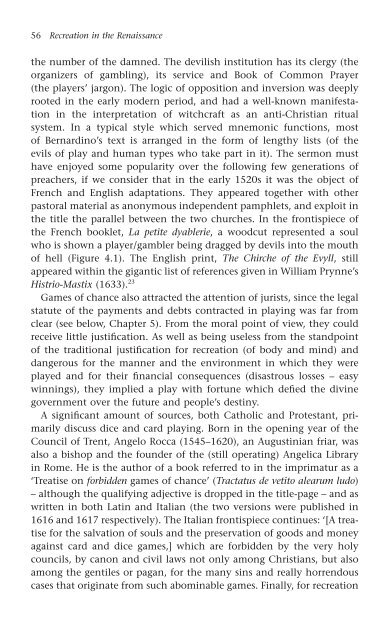Recreation in the Renaissance
Recreation in the Renaissance
Recreation in the Renaissance
- No tags were found...
You also want an ePaper? Increase the reach of your titles
YUMPU automatically turns print PDFs into web optimized ePapers that Google loves.
56 <strong>Recreation</strong> <strong>in</strong> <strong>the</strong> <strong>Renaissance</strong><br />
<strong>the</strong> number of <strong>the</strong> damned. The devilish <strong>in</strong>stitution has its clergy (<strong>the</strong><br />
organizers of gambl<strong>in</strong>g), its service and Book of Common Prayer<br />
(<strong>the</strong> players’ jargon). The logic of opposition and <strong>in</strong>version was deeply<br />
rooted <strong>in</strong> <strong>the</strong> early modern period, and had a well-known manifestation<br />
<strong>in</strong> <strong>the</strong> <strong>in</strong>terpretation of witchcraft as an anti-Christian ritual<br />
system. In a typical style which served mnemonic functions, most<br />
of Bernard<strong>in</strong>o’s text is arranged <strong>in</strong> <strong>the</strong> form of lengthy lists (of <strong>the</strong><br />
evils of play and human types who take part <strong>in</strong> it). The sermon must<br />
have enjoyed some popularity over <strong>the</strong> follow<strong>in</strong>g few generations of<br />
preachers, if we consider that <strong>in</strong> <strong>the</strong> early 1520s it was <strong>the</strong> object of<br />
French and English adaptations. They appeared toge<strong>the</strong>r with o<strong>the</strong>r<br />
pastoral material as anonymous <strong>in</strong>dependent pamphlets, and exploit <strong>in</strong><br />
<strong>the</strong> title <strong>the</strong> parallel between <strong>the</strong> two churches. In <strong>the</strong> frontispiece of<br />
<strong>the</strong> French booklet, La petite dyablerie, a woodcut represented a soul<br />
who is shown a player/gambler be<strong>in</strong>g dragged by devils <strong>in</strong>to <strong>the</strong> mouth<br />
of hell (Figure 4.1). The English pr<strong>in</strong>t, The Chirche of <strong>the</strong> Evyll, still<br />
appeared with<strong>in</strong> <strong>the</strong> gigantic list of references given <strong>in</strong> William Prynne’s<br />
Histrio-Mastix (1633). 23<br />
Games of chance also attracted <strong>the</strong> attention of jurists, s<strong>in</strong>ce <strong>the</strong> legal<br />
statute of <strong>the</strong> payments and debts contracted <strong>in</strong> play<strong>in</strong>g was far from<br />
clear (see below, Chapter 5). From <strong>the</strong> moral po<strong>in</strong>t of view, <strong>the</strong>y could<br />
receive little justification. As well as be<strong>in</strong>g useless from <strong>the</strong> standpo<strong>in</strong>t<br />
of <strong>the</strong> traditional justification for recreation (of body and m<strong>in</strong>d) and<br />
dangerous for <strong>the</strong> manner and <strong>the</strong> environment <strong>in</strong> which <strong>the</strong>y were<br />
played and for <strong>the</strong>ir f<strong>in</strong>ancial consequences (disastrous losses – easy<br />
w<strong>in</strong>n<strong>in</strong>gs), <strong>the</strong>y implied a play with fortune which defied <strong>the</strong> div<strong>in</strong>e<br />
government over <strong>the</strong> future and people’s dest<strong>in</strong>y.<br />
A significant amount of sources, both Catholic and Protestant, primarily<br />
discuss dice and card play<strong>in</strong>g. Born <strong>in</strong> <strong>the</strong> open<strong>in</strong>g year of <strong>the</strong><br />
Council of Trent, Angelo Rocca (1545–1620), an August<strong>in</strong>ian friar, was<br />
also a bishop and <strong>the</strong> founder of <strong>the</strong> (still operat<strong>in</strong>g) Angelica Library<br />
<strong>in</strong> Rome. He is <strong>the</strong> author of a book referred to <strong>in</strong> <strong>the</strong> imprimatur as a<br />
‘Treatise on forbidden games of chance’ (Tractatus de vetito alearum ludo)<br />
– although <strong>the</strong> qualify<strong>in</strong>g adjective is dropped <strong>in</strong> <strong>the</strong> title-page – and as<br />
written <strong>in</strong> both Lat<strong>in</strong> and Italian (<strong>the</strong> two versions were published <strong>in</strong><br />
1616 and 1617 respectively). The Italian frontispiece cont<strong>in</strong>ues: ‘[A treatise<br />
for <strong>the</strong> salvation of souls and <strong>the</strong> preservation of goods and money<br />
aga<strong>in</strong>st card and dice games,] which are forbidden by <strong>the</strong> very holy<br />
councils, by canon and civil laws not only among Christians, but also<br />
among <strong>the</strong> gentiles or pagan, for <strong>the</strong> many s<strong>in</strong>s and really horrendous<br />
cases that orig<strong>in</strong>ate from such abom<strong>in</strong>able games. F<strong>in</strong>ally, for recreation










